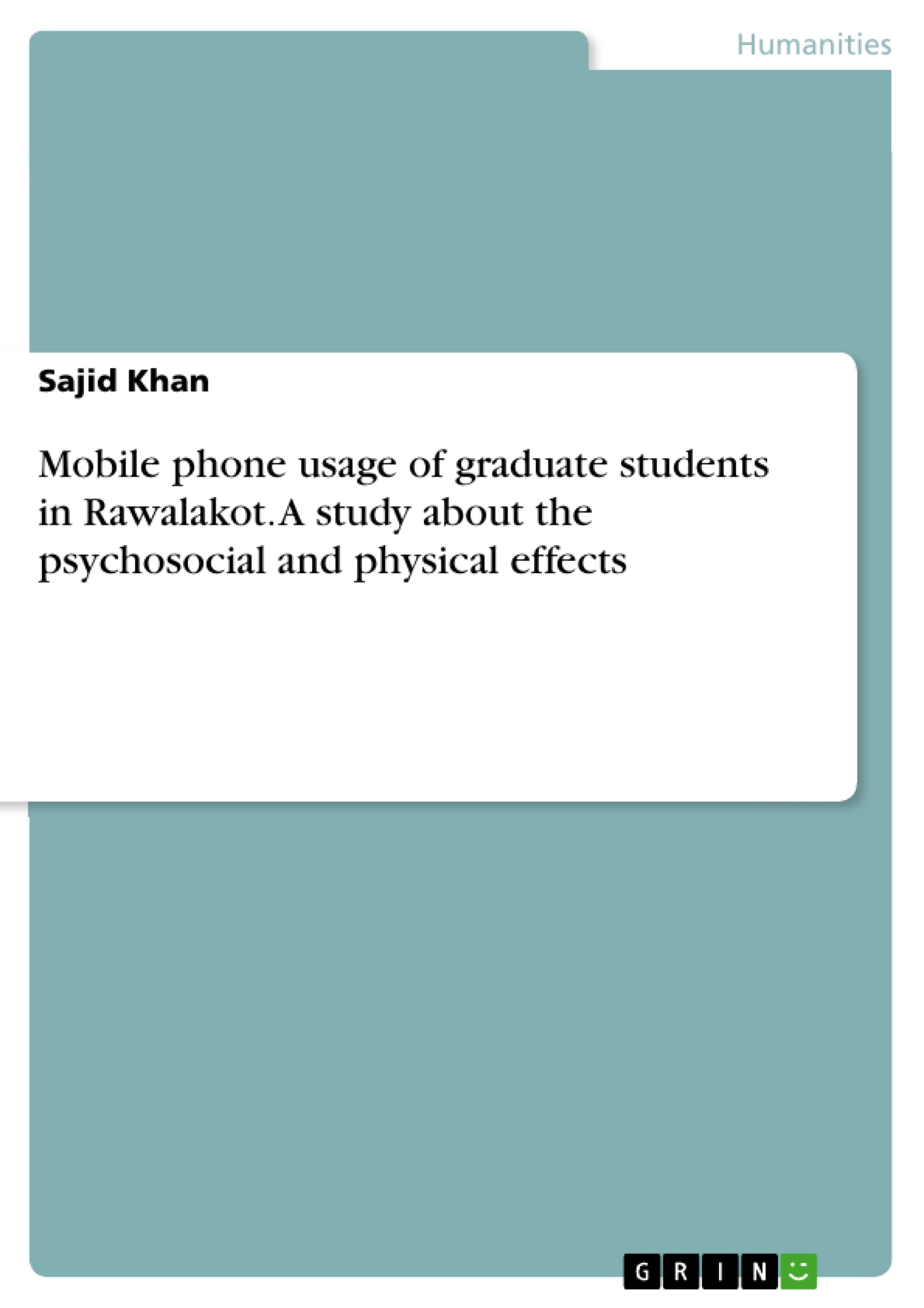The findings from this study revealed that perceptions on students mobile phone use are not satisfactory. The responses revealed that there were 86.66% who answers ‘Happy’ and 13.34% answers ‘Unhappy’. The major themes are maturity of students and legal age. Both these reflect the level of physical and psychological development in students that in turn establishes a confidence to provide them with a mobile phone. Need for the device reflects that mobile phones are a necessity from an appropriate age for some family situations. In this research we observe that colour of mobile effects on psychological behaviour on student. Mostly graduate college students in Rawalakot used SMS, MMS, music, games, Internet like as e-mail and Facebook etc. In this locality, average usage of mobile phone in graduate students 7.5 hours per day.
In Rawalakot (Azad Kashmir) no research work on mobile phone usage published which cover all the risk factors which are included in this research. The present study will be conducted with the following objectives: To gain an understanding of graduate students mobile phone usage (positive purposes, negative impacts), to understand the influence of texting on graduate students (such as text language on proper language and text messaging on communication skills) and to understand the effect on graduate students physical (health) and psychological (such as bullying, un-monitored time usage, family time).
Inhaltsverzeichnis (Table of Contents)
- INTRODUCTION
- MAIN OBJECTIVES OF THE STUDY
- LITERATURE REVIEW
Zielsetzung und Themenschwerpunkte (Objectives and Key Themes)
This study examines the psychosocial implications of mobile phone usage among graduate students in Rawalakot, Azad Kashmir. The research aims to understand the positive and negative impacts of mobile phone use on student well-being, communication skills, and social interactions.
- The impact of mobile phone use on graduate students' physical and psychological health.
- The influence of texting on graduate students' language and communication skills.
- The role of mobile phones in shaping social interactions and relationships among graduate students.
- The perception of mobile phones as a necessity and the significance of their features in shaping student behavior.
Zusammenfassung der Kapitel (Chapter Summaries)
- INTRODUCTION: This chapter explores the significance of mobile phones in contemporary society, highlighting their impact on communication, interaction, and information retrieval. It introduces the concept of "digital natives" and discusses the evolution of mobile phone technology and its ubiquity.
- MAIN OBJECTIVES OF THE STUDY: This chapter outlines the research objectives, focusing on understanding graduate students' mobile phone usage, the influence of texting on their communication, and the effects on their physical and psychological well-being.
- LITERATURE REVIEW: This chapter examines existing research on mobile phone use and its implications for young adults. It explores themes related to body language, social networking, emotional significance of text messaging, and the quantification of popularity through mobile phone usage.
Schlüsselwörter (Keywords)
The main keywords and focus topics of this study include mobile phone usage, graduate students, psychosocial implications, communication skills, social interactions, digital natives, texting, and health.
Frequently Asked Questions
What are the psychosocial effects of mobile phone use among students in Rawalakot?
The study explores how mobile phone usage affects psychological behavior, maturity levels, and social interactions, noting that students spend an average of 7.5 hours per day on their devices.
Does the color of a mobile phone affect student behavior?
Yes, the research observes that the color of the mobile device can have an impact on the psychological behavior of the students.
How does texting influence language skills?
The study examines the influence of "text language" on proper language use and how constant messaging affects the overall communication skills of graduate students.
What are the physical health risks associated with high mobile phone usage?
The research aims to understand the physical impacts, including health risks related to unmonitored time usage and its effect on family time and physical well-being.
What are the main activities students perform on their phones?
Graduate students in Rawalakot primarily use their phones for SMS, MMS, music, games, and internet services like e-mail and Facebook.
- Quote paper
- Sajid Khan (Author), 2017, Mobile phone usage of graduate students in Rawalakot. A study about the psychosocial and physical effects, Munich, GRIN Verlag, https://www.grin.com/document/380318



